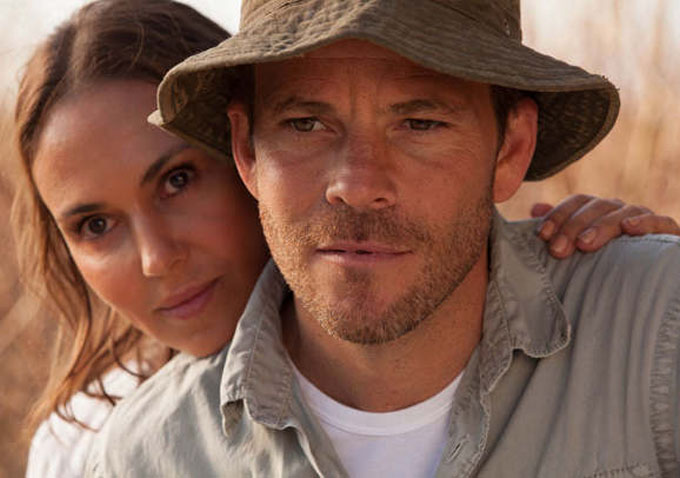 The sun bears down on the characters in
The sun bears down on the characters in
“Heatstroke," a new suspense thriller set in the African desert.
At first it feels like an inspired location, a way to provide color
to a familiar hide-and-seek chase actioner. But as the film goes on,
the sun almost seems as if it’s burning its own location, bearing
down on its characters as a constant, unspoken judge. It’s the sun
who is going to reveal a hiding space, the sun who is going to keep
water out of reach. It’s the sun that will provide constant reminder
of regret for the mistakes characters make.
“Heatstroke” begins in the confines
of the academic world. Stephen Dorff plays Paul, a sexy research
professor with a love of the wilderness that completely surpasses not
only his feelings for an ex-wife, but also model-esque new love Tally
(model-esque Svetlana Metkina). Unfortunately, wayward daughter Josie
(Maisie Williams) suspects the same, and when she commits several
teenage off-camera transgressions, Mom sentences her to spending time
with Dad in the wild.
Movies like “Heatstroke” try to
capture the insouciance of youth, with young characters too cocky to
admit their mistakes, or their purposeful, ultimately empty
rebellion. Unfortunately, sometimes they try a bit too hard: Josie is
both a pathological liar and a shut-in. Even if we didn’t know she
was busted for pot, her haughty protestations wouldn’t hold water.
Williams, and the film, stack the deck heavily against this character
in the early goings. There are leopards and lizards and boars
everywhere. Why are you still playing computer games on your iPad?
Despite the device being normalized in the average household, why
does this movie feature characters repeatedly saying the word “iPad”?
Why is this a thing?
This wouldn’t be a problem if there was
anything believable about Paul, Open-Collar Renegade Scientist.
Dorff’s always been an edgy, fox-like actor with a wily
street-intelligence, but he’s never been the sort that looks like
he’s ever picked up a book. He’s best with the salt-of-the-earth
stuff; when Paul calls Josie over to witness the behavior of animals
in the wild, she rejects his call, which saves Dorff from trying to
convince us he’s spent hours inside an office memorizing terms and
learning new species. Paul and Josie are like fire and ice. Metkina’s
Tally is ultimately just the wet blanket that lies beneath.
But an unfortunate chance encounter
takes Paul out of the picture, placing Tally and Josie in the sights
of a group of illegal poachers. This development kicks the film
firmly into genre, a formal decision that depends on character
development. However, the conflicts between characters are ultimately
simple and avoidable, revealing nothing about them. By the time
Josie and Tally are forced to relate to each other, we don’t know
anything about them other than one of them is an immovable force, and
the other just wants everyone to get along. Not exactly riveting
stuff; none of the decisions made from this point on suggest any sort
of difficulty, just obligation. Josie wants to stay alive. Tally
wants to keep her alive. They have to survive the wilderness. The
movie might as well be about the animals being stalked.
Of course Peter Stormare shows up as
the sleazy head of the criminals. Of course he’s being forced to do
the world’s most unconvincing American accent. And of course his
henchmen are faceless grunts who have no inner lives, and who mostly
crack jokes at each others’ expense, knowing full well they’re
disposable idiots on a mission in the desert. Some suspense thrillers
are spare, spartan, relying on the primal appeal of a cat-and-mouse
chase. And some are just chess matches with a sea of pawns shifted,
pushed and pulled in different directions. You wish Evelyn Purcell‘s
action thriller just had a bit more character, and not a
budget-cutting location that looked great in front of a camera. [D+]

